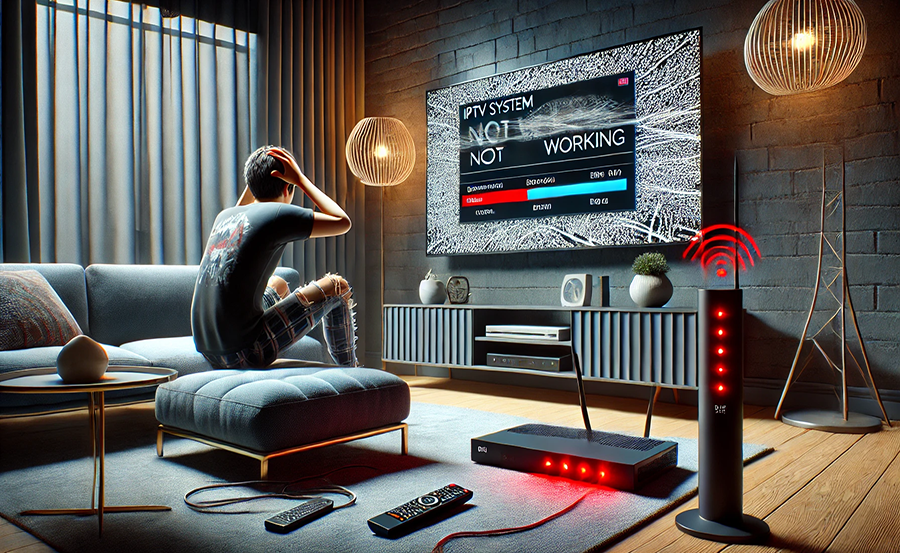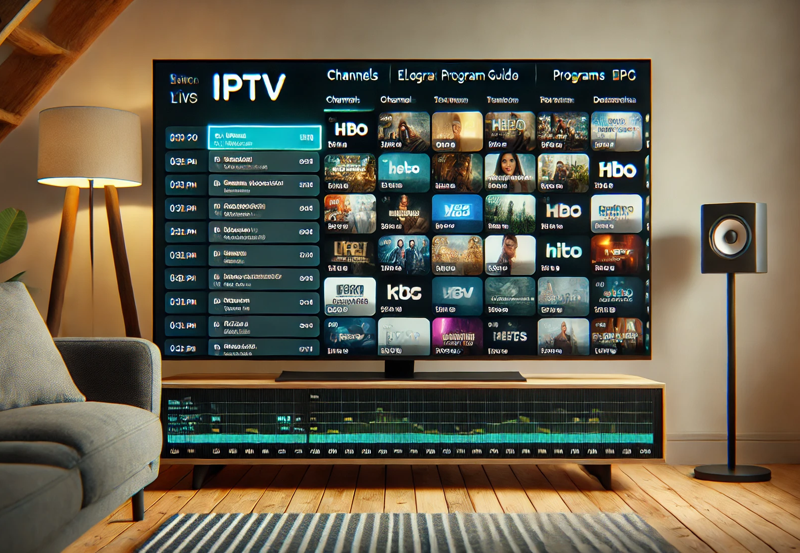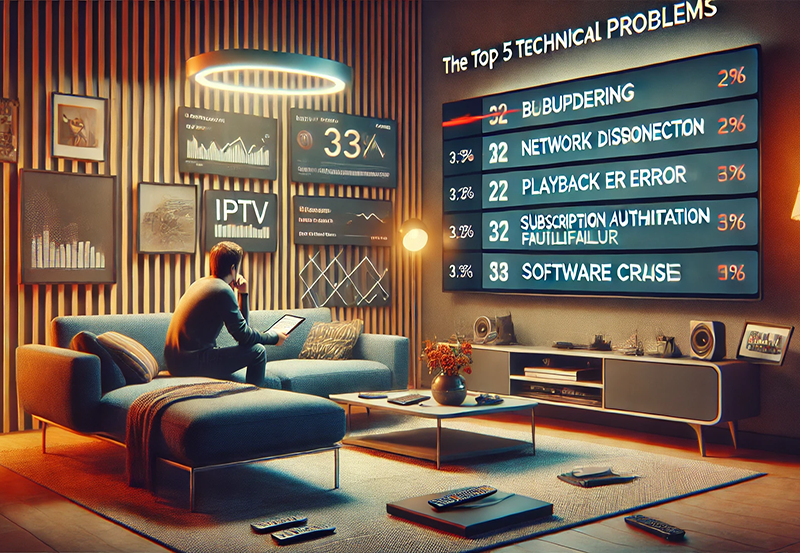Struggling with IPTV connectivity can be an incredibly frustrating experience, especially when all you want is a seamless viewing session of your favorite shows. If you’re tired of buffering and unreliable connections, you’ve come to the right place. Let’s explore some advanced troubleshooting tips that might just get you back to watching your best IPTV channels without interruptions.
Buy 1 Year IPTV Subscription and Enjoy Unlimited Content
Understanding Common IPTV Connectivity Issues
Before diving into fixes, it’s essential to identify what’s causing the trouble. IPTV connectivity issues can often stem from a variety of factors. From hardware hiccups to software snafus, let’s break down the usual suspects.
Hardware Compatibility Issues
The hardware involved in an IPTV setup plays a crucial role in its overall performance. Not every device is designed the same, and some older models might not keep up with new IPTV standards.
Outdated Devices
Using outdated streaming devices could be a bottleneck. Make sure your IPTV box or TV stick is reasonably modern. Consider upgrading if it’s been more than a few years since your last purchase.
Faulty Cables and Connections
Often overlooked, faulty cables can greatly affect connectivity. Check all your Ethernet and HDMI cables for damage. Even a slight bend could impact the signal quality drastically.
Software Glitches and Incompatibilities
Software is another common culprit in IPTV malfunctions. Like hardware, it requires regular updates to function correctly. Let’s look at possible issues and remedies.
Outdated Software
Ensure your IPTV software is updated to the latest version. Most apps provide an update option within settings. Up-to-date software can clear out glitches causing connectivity issues.
Incompatible IPTV Apps
Not every IPTV app works well with every service or device. Ensure that the app you are using is compatible with your certain setup. Try a different app if problems persist.
The Role of Internet Service Providers
Sometimes, the issue might not be local. Your Internet Service Provider (ISP) could play a part in connection problems, especially with IPTV services.
Throttling and Bandwidth Limitations
ISPs are known to throttle bandwidth, which can seriously affect streaming quality. Check your internet plan—some ISPs offer plans more suited for streaming purposes.
Data Caps
Many ISPs impose data caps. Exceeding these limits can lead to throttled speeds. Verify whether this applies to your plan and consider upgrading if necessary.
Network Congestion
Your internet connection may also slow down during peak hours—early evenings, for example—as more users log on. Consider using IPTV during off-peak times, or inquire if your ISP offers priority data options.
Router Configurations
Your router’s configuration can also affect how IPTV works. A router not correctly set up could lead to unstable connections.
QoS Settings
Quality of Service (QoS) settings on your router enable you to prioritize IPTV traffic over other types of data. Look into your router manual or online tutorials if these settings are available.
Wi-Fi vs Wired Connections
Wi-Fi is convenient but less reliable than a wired Ethernet connection. For optimal IPTV performance, try using a wired connection whenever possible.
Optimizing Your IPTV Experience
Moving beyond basic fixes, let’s optimize your setup to ensure the best viewing experience possible.
Choosing the Right IPTV Service
Selecting a reliable service is the foundation of a great streaming experience. However, how can you determine if you’re picking the best IPTV channels available?
Research and Reviews
Online reviews can provide valuable insights. Look for services with consistently positive feedback but do be wary of too-good-to-be-true promises.
Free Trials
Many services offer a trial period. This is your opportunity to test and determine if the picture quality, channel lineup, and performance meet your needs without immediate financial commitment.
Network Enhancements
Simple changes can dramatically improve how IPTV runs on your network. Here’s what you can consider doing.
Upgrade Your Router
If your router is more than a few years old, it might be time for an upgrade. Newer routers come with features that support more robust streaming like beamforming and dual-band options.
Strong Passwords
Ensure your Wi-Fi network is secure with a strong password. Uncontrolled access to your network can slow down your connection significantly.
- Choose a mixture of letters, numbers, and symbols for passwords.
- Consider changing passwords regularly.
The Legality of IPTV Services: What You Need to Know
Affordable IPTV Options
While optimizing, affordability remains a concern. Discovering affordable IPTV options without compromising quality is entirely possible.
Compare Several Providers
Don’t stick to the first provider sponsored in your search results. Compare alternatives, paying attention to terms and conditions as well as actual viewer feedback.
Special Promotions and Bundles
Keep an eye out for promotions and bundle offers. These packages often include discounts on multiple services, providing more value for lesser money.
Real-World Scenarios and Solutions
To make this guide even more practical, let’s dig into real scenarios you might face with IPTV and how to solve them.
Randomly Disconnecting Streams
A frequently encountered problem, losing your stream at random times, can happen to anyone. Addressing these issues can stabilize your viewing experience.
Check Memory Usage
Your device’s memory might be overtaxed. Close any unused applications and check if there’s a system update available that optimizes resource allocation.
Reboot Regularly
Restarting your router or streaming device can refresh the network connection and memory usage. Make this a habit to prevent ongoing issues.
Buffering Videos
Buffering is one of the most frustrating experiences when streaming. Often, simple adjustments can make a giant leap in solving this issue.
Adjust Video Quality
Most IPTV applications allow you to adjust video quality. Lowering the resolution can reduce buffering if bandwidth is a concern.
Router Placement
Your router’s position matters. Ensure it is centrally located and not obstructed by walls or furniture for optimal signal distribution.
Black Screen Problems
Encountering a black screen can halt your entertainment without any warning. Here are some suggestions for handling this issue swiftly:
App and Device Updates
Update both the IPTV app and your device’s firmware. Patching can resolve bugs causing this black screen ordeal.
HDMI Cable Check
Inspect your HDMI cable and ports for any signs of damage. Swap out cables or try a different port if the problem persists.
A Look Into the Future of IPTVs
The world of IPTV technology is ever-evolving. Anticipating future developments can help you prepare for maintaining top-notch viewing standards.
Adopting New Technologies
Stay updated with the latest technological advancements in IPTV for superior IPTV viewing.
AI and IPTV
Artificial Intelligence is set to transform the way we experience IPTV, from personalized content to improved compression algorithms, enhancing stream quality.
5G Networks
The rollout of 5G networks promises lower latency and faster speeds, paving the way for seamless IPTV services.
Eco-Friendly Solutions
With increasing environmental awareness, sustainable IPTV practices are on the rise. From device manufacturing to streaming, eco-friendly measures are becoming a standard expectation.
Energy-efficient Devices
Invest in energy-efficient streaming devices to lower both your carbon footprint and electricity bills.
Cloud Streamlines
Cloud-based streaming services offer optimizations for energy usage, becoming a green alternative to bulky hardware setups.
Frequently Asked Questions

Why does my IPTV service keep buffering?
Buffering usually happens due to bandwidth constraints, weak Wi-Fi signals, or peak-time network congestion. Consider a wired connection and lower video quality settings.
How do I find affordable IPTV services?
Research multiple providers, look for user reviews, and search for promotions or bundle deals that match your viewing needs.
Can my internet provider affect IPTV performance?
Yes, your ISP can impact performance through throttling, data caps, and network congestion. Checking your plan and communicating with your provider could help improve conditions.
What hardware do I need for the best IPTV channels?
A modern, reliable IPTV box or streaming device, sturdy and compatible cables, along with a robust router, are critical components for superior IPTV viewing.
What should I consider before updating my IPTV software?
Ensure your current device supports the latest updates and your internet connection is stable to prevent disruptions during the update process.
Is it worth upgrading to a 5G connection for IPTV?
If available and feasible, a 5G connection could provide a faster, more stable IPTV experience, especially if experiencing high network congestion in your area.
How often should I reboot my devices for optimal IPTV performance?
Rebooting devices weekly can help maintain optimal performance and resolve minor, repetitive issues unnoticed over time.
Shared or Dedicated Bandwidth: Best for IPTV?




